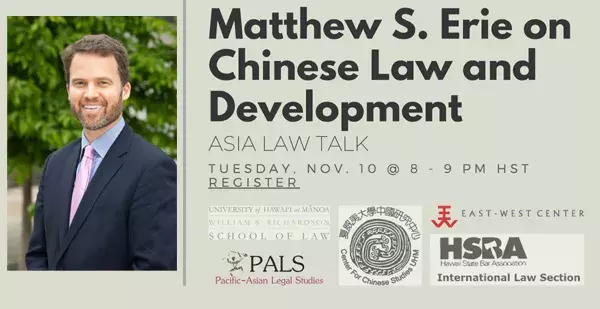Error message


The COVID-19 pandemic has cast doubt on taken-for-granted economic and governance models. Against the backdrop of increasing tension between the United States and the People’s Republic of China (PRC or China), China is presenting itself as an alternative center for governance. Pursuant to these seismic shifts, the analysis must attune to how China creates cross-border order. Whereas scholars have examined China’s use of trade and investment law, inadequate attention has been paid to how the PRC grapples with the domestic law of host states. As the PRC seeks to protect its investments abroad and promote its geopolitical interests, it is confronted with questions familiar to capital- exporting countries, yet there is little understanding of China’s approach to ordering or what it means for host states, developed economies, and global governance.
This talk seeks to provide an analytical framework for China’s approach, and specifically the role of law in global development. Instead of previous approaches to “law and development, ”chiefly, that of the United States, China is reluctant to engage in legal reform of host states that receive Chinese capital; rather, Chinese investors try to avoid local law. “Chinese law and development” (CLD) creates order through transnational law, which builds on legal infrastructures both from the United States and from China, supplemented by extralegal and nonlegal norms. These normative orders protect Chinese investments by mitigating risk as a precondition to promoting China’s economic and political interests overseas. Drawing on three years of fieldwork and nearly 150 interviews in China and in host states, this talk presents the first empirical study of CLD to articulate an analytical theory to understand thisphenomenon. In assessing CLD, I query whether CLD is good for developing states, and identify a research agenda for the study of the legal and regulatory dimensions of Chinese economic globalization.
Please register here, https://hawaii.zoom.us/webinar/register/WN_yCxVXjo5Rdyx-cuq3WX5ug (link is external)
Matthew S. Erie (J.D., Ph.D.) is an Associate Professor of Modern Chinese Studies and Associate Research Fellow of the Socio-Legal Studies Centre at the University of Oxford. His interdisciplinary work combines law and anthropology to expand the theoretical bases and empirical borders of comparative law, with a particular focus on Chinese law, Islamic law, and Asian law, more generally. Specifically, he has written on Chinese domestic law (e.g., property law, constitutional law, and ethnic and religious policy) and international law (e.g., dispute resolution, conflict of laws, anti-corruption law, and investment law). His work has either appeared in or is forthcoming in such journals as the Harvard International Law Journal, Virginia Journal of International Law, American Journal of Comparative Law, Law and Social Inquiry, and American Ethnologist. His first book, China and Islam: The Prophet, the Party, and Law (Cambridge University Press, 2016), is the first ethnographic study of the relationship between sharia and state law in China. His current research project “China, Law and Development,” funded by a European Research Council Starting Grant (€1.5 million), examines China’s approach to building cross-border order through international economic law and the regulatory regimes of developing host states.
Professor Erie previously held academic positions at Princeton University and New York University Law School, and he was a visiting scholar at the National University Singapore Law Faculty. He practiced law at Paul Hastings LLP in New York and Beijing, and is a member of the National Committee on U.S.-China Relations and Co-Chair of the American Society of International Law's Asia-Pacific Interest Group.
William S. Richarson School of Law; Pacific-Asian Legal Studies (PALS); Center for Chinese Studies; Hawaii State Bar Association, International Law Section and the East-West Center.
https://www.matthewserie.com/(link is external)
Click to download the event flyer.

The COVID-19 pandemic has cast doubt on taken-for-granted economic and governance models. Against the backdrop of increasing tension between the United States and the People’s Republic of China (PRC or China), China is presenting itself as an alternative center for governance. Pursuant to these seismic shifts, the analysis must attune to how China creates cross-border order. Whereas scholars have examined China’s use of trade and investment law, inadequate attention has been paid to how the PRC grapples with the domestic law of host states. As the PRC seeks to protect its investments abroad and promote its geopolitical interests, it is confronted with questions familiar to capital- exporting countries, yet there is little understanding of China’s approach to ordering or what it means for host states, developed economies, and global governance.
This talk seeks to provide an analytical framework for China’s approach, and specifically the role of law in global development. Instead of previous approaches to “law and development, ”chiefly, that of the United States, China is reluctant to engage in legal reform of host states that receive Chinese capital; rather, Chinese investors try to avoid local law. “Chinese law and development” (CLD) creates order through transnational law, which builds on legal infrastructures both from the United States and from China, supplemented by extralegal and nonlegal norms. These normative orders protect Chinese investments by mitigating risk as a precondition to promoting China’s economic and political interests overseas. Drawing on three years of fieldwork and nearly 150 interviews in China and in host states, this talk presents the first empirical study of CLD to articulate an analytical theory to understand thisphenomenon. In assessing CLD, I query whether CLD is good for developing states, and identify a research agenda for the study of the legal and regulatory dimensions of Chinese economic globalization.
Please register here, https://hawaii.zoom.us/webinar/register/WN_yCxVXjo5Rdyx-cuq3WX5ug (link is external)
Matthew S. Erie (J.D., Ph.D.) is an Associate Professor of Modern Chinese Studies and Associate Research Fellow of the Socio-Legal Studies Centre at the University of Oxford. His interdisciplinary work combines law and anthropology to expand the theoretical bases and empirical borders of comparative law, with a particular focus on Chinese law, Islamic law, and Asian law, more generally. Specifically, he has written on Chinese domestic law (e.g., property law, constitutional law, and ethnic and religious policy) and international law (e.g., dispute resolution, conflict of laws, anti-corruption law, and investment law). His work has either appeared in or is forthcoming in such journals as the Harvard International Law Journal, Virginia Journal of International Law, American Journal of Comparative Law, Law and Social Inquiry, and American Ethnologist. His first book, China and Islam: The Prophet, the Party, and Law (Cambridge University Press, 2016), is the first ethnographic study of the relationship between sharia and state law in China. His current research project “China, Law and Development,” funded by a European Research Council Starting Grant (€1.5 million), examines China’s approach to building cross-border order through international economic law and the regulatory regimes of developing host states.
Professor Erie previously held academic positions at Princeton University and New York University Law School, and he was a visiting scholar at the National University Singapore Law Faculty. He practiced law at Paul Hastings LLP in New York and Beijing, and is a member of the National Committee on U.S.-China Relations and Co-Chair of the American Society of International Law's Asia-Pacific Interest Group.
William S. Richarson School of Law; Pacific-Asian Legal Studies (PALS); Center for Chinese Studies; Hawaii State Bar Association, International Law Section and the East-West Center.
https://www.matthewserie.com/(link is external)
Click to download the event flyer.






